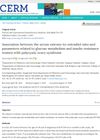 34 citations,
June 2010 in “Archives of Disease in Childhood”
34 citations,
June 2010 in “Archives of Disease in Childhood” Menstrual disorders are common in adolescents and can be influenced by weight, activity, and health issues, requiring careful evaluation and more research for effective treatment.
 18 citations,
April 2011 in “International Journal of Molecular Medicine”
18 citations,
April 2011 in “International Journal of Molecular Medicine” Dihydrotestosterone causes p27 protein breakdown in ovarian and breast cancer cells by binding with SKP2.
[object Object] January 2016 in “프로그램북(구 초록집)” Hormones and neuropeptides affect hair growth, with androgens having opposite effects on beard and scalp hair.
1 citations,
March 2021 in “medRxiv (Cold Spring Harbor Laboratory)” Many males in Jordan misuse oral contraceptive pills for hair growth, muscle gain, and acne treatment.
 17 citations,
September 2017 in “Journal of Cosmetic Dermatology”
17 citations,
September 2017 in “Journal of Cosmetic Dermatology” Women with PCOS in North China often have hirsutism and acne, with hirsutism linked to metabolic issues.
 9 citations,
November 2013 in “Presse Medicale”
9 citations,
November 2013 in “Presse Medicale” The document concludes that managing female hyperandrogenism requires a combination of identifying the cause, lifestyle changes, medication, and cosmetic treatments.
 17 citations,
July 2015 in “Biomolecules and Biomedicine”
17 citations,
July 2015 in “Biomolecules and Biomedicine” High Nesfatin-1 and low Vitamin D may increase blood pressure and heart rate in women with PCOS.
 17 citations,
May 2012 in “Clinical Endocrinology”
17 citations,
May 2012 in “Clinical Endocrinology” Surgery to lower high testosterone in postmenopausal women with certain ovarian tumors doesn't significantly affect their metabolism.
 4 citations,
December 2021 in “Clinical and Experimental Reproductive Medicine”
4 citations,
December 2021 in “Clinical and Experimental Reproductive Medicine” Higher estrone-to-estradiol ratios are linked to worse glucose metabolism and insulin resistance in women with PCOS.
 June 2020 in “Aesthetic Surgery Journal”
June 2020 in “Aesthetic Surgery Journal” Estradiol-rich plasma can increase hair density faster and more effectively in male pattern baldness treatment than regular plasma.
 4 citations,
October 2007 in “Dermatologic Clinics”
4 citations,
October 2007 in “Dermatologic Clinics” Glucocorticoids and sex hormones affect skin health, with potential for targeted treatments to minimize side effects and treat skin conditions.
2 citations,
August 2022 in “Middle East Fertility Society Journal” The new rodent model successfully mimics non-lean human PCOS symptoms.
[object Object]  9 citations,
November 2011 in “Cytokine”
9 citations,
November 2011 in “Cytokine” Finasteride helps reduce lung inflammation and damage after trauma and infection.
 62 citations,
August 2018 in “Frontiers in Endocrinology”
62 citations,
August 2018 in “Frontiers in Endocrinology” Androgens are important for normal ovarian function and estrogen production, but may not be the main cause of follicle death.
 1 citations,
December 2011
1 citations,
December 2011 Marine-derived ingredients show potential for hair health but need more human trials to confirm effectiveness.
 97 citations,
February 2007 in “Clinical Obstetrics and Gynecology”
97 citations,
February 2007 in “Clinical Obstetrics and Gynecology” The definition of Polycystic Ovary Syndrome may change with new research, and careful screening is key for managing the condition.
 3 citations,
May 2014 in “InTech eBooks”
3 citations,
May 2014 in “InTech eBooks” Copper deficiency may cause hair loss, and treating it could involve nutrition and hormones.
 31 citations,
March 2015 in “The Journal of Steroid Biochemistry and Molecular Biology”
31 citations,
March 2015 in “The Journal of Steroid Biochemistry and Molecular Biology” Neuroactive steroids could become safe, effective treatments with more understanding of their complex brain actions and metabolism.
 69 citations,
September 2006 in “Human Reproduction”
69 citations,
September 2006 in “Human Reproduction” Women with PCOS have fewer activated T cells in their ovarian follicles, which might affect fertility.
 6 citations,
January 2016 in “Annals of Dermatology”
6 citations,
January 2016 in “Annals of Dermatology” Human hair contains more glycosaminoglycans in children than adults, and these compounds decrease with age, possibly affecting hair thickness.
 5 citations,
November 2016 in “Experimental and Therapeutic Medicine”
5 citations,
November 2016 in “Experimental and Therapeutic Medicine” BeauTop improves hair growth in androgenetic alopecia patients.
 July 2021 in “Archives of Dermatological Research”
July 2021 in “Archives of Dermatological Research” Alopecia patients have less GPER-1, which might affect hair loss.
 2 citations,
April 2016 in “Medical Hypotheses”
2 citations,
April 2016 in “Medical Hypotheses” Antioxidants might help prevent pressure ulcers, but more research is needed to find effective ones.
 May 2021 in “Journal of the Endocrine Society”
May 2021 in “Journal of the Endocrine Society” A rare ovarian cancer with a good outlook was found in a woman with unusual hair growth and abdominal symptoms.
 4 citations,
January 2019 in “Therapeutic Advances in Endocrinology and Metabolism”
4 citations,
January 2019 in “Therapeutic Advances in Endocrinology and Metabolism” Medications for PCOS don't seem to raise heart disease risk.
 33 citations,
December 2015 in “Neuroendocrinology”
33 citations,
December 2015 in “Neuroendocrinology” Finasteride treatment changes brain steroid levels and receptors, affecting brain function even after stopping treatment.
 26 citations,
May 2012 in “Cellular and Molecular Life Sciences”
26 citations,
May 2012 in “Cellular and Molecular Life Sciences” NcoA4 may have roles beyond helping control gene activity, possibly affecting cell behavior and stability.
 37 citations,
January 2009 in “Sexual Development”
37 citations,
January 2009 in “Sexual Development” Fadrozole and Finasteride change frog sex ratios and cause intersex animals with altered gene expressions.
 19 citations,
November 2021 in “Reviews in endocrine and metabolic disorders”
19 citations,
November 2021 in “Reviews in endocrine and metabolic disorders” Sex hormones like estrogen and testosterone may affect COVID-19 severity differently in men and women, potentially influencing prevention and treatment strategies.
 3 citations,
April 2019 in “Hormone and Metabolic Research”
3 citations,
April 2019 in “Hormone and Metabolic Research” Women with PCOS have lower adiponectin hormone levels and are more likely to have insulin resistance.



























